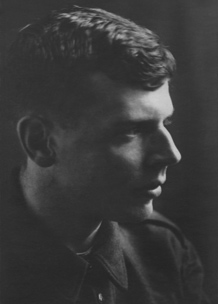
Photo of Ivor Gurney, Christmas 1917 (Ivor Gurney Estate/Gloucestershire Archives).
Re-discovering poetry and song from World War One
First World War poet Ivor Gurney is the subject of a major research project led by the Centre for South West Writing at the University of Exeter.
While fighting in France, Gurney wrote much of his best poetry and music, often recalling the loved landscapes of the West Country as an escape from the bloodshed around him.
Whether as inspiration for his numerous musical works or in his poetic depictions of the hills, woods and waterways of his native Gloucestershire, Gurney’s creativity helped him to overcome his profound homesickness.
Philip Lancaster, a researcher at the University of Exeter, has a special interest in WW1 composers and is an expert on Ivor Gurney’s musical as well as his literary talents. He has prepared scores of songs and other works for performance, recording and publication. Notable amongst these is Gurney’s War Elegy for orchestra, composed shortly after the war at around the time of the unveiling of the Whitehall Cenotaph and the interment in Westminster Abbey of the Unknown Warrior. Earlier this year he orchestrated and published the first of Gurney’s choral works to be brought to performance in modern times: a 1921 setting of a poem by fellow ‘war poet’, Edward Thomas, titled The Trumpet.
Through a jointly funded project with Great Western Research, the University of Exeter and Gloucestershire Archives, Philip is seeking to increase the public’s knowledge of Gurney’s work. Whilst examining and cataloguing in the Gurney archive in Gloucester Philip said, ‘Although Gurney has been increasingly anthologised, much of his work is unknown; there are still hundreds of poems yet to be published. These can present new facets of Gurney’s work in his responses to landscape, locality, history and culture, as well as war, which are unique and provocative.’
The outcome of his current research will be the publication of a 3-volume critical edition of Gurney’s complete poetry as part of the Oxford University Press’s prestigious Oxford English Texts series. The poetry edition will be co-edited with Exeter’s Director of the Centre for South West Writing, Professor Tim Kendall, who has also written extensively on Gurney’s poetry.
The following poem, written in December 1916 whilst serving on the Somme, shows how Gurney escaped into thoughts of the West Country in an attempt to counteract the sights he met on the front line.
The Strong Thing
I have seen death and the faces of men in fear
Of Death, and shattered, terribly ruined flesh,
Appalled; but through the horror, coloured and clear
The love of my County, Gloucester, rises afresh.
And on the Day of Days, the Judgment Day,
The Word of Doom awaiting breathless and still,
I’ll marvel how sweet’s the air down Framilode way,
And take my sentence on sheer-down Crickley Hill.
Photo above courtesy of Ivor Gurney, Christmas 1917 (Ivor Gurney Estate/Gloucestershire Archives)
Date: 11 November 2008
